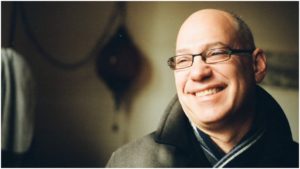
Q&A: Joshua Major on New England Conservatory’s 10-Show Run Over Four Days
By Afton WootenThree operas and 10 performances over the course of four days is what the New England Conservatory (NEC) will take on later this month.
From April 21 -24 NEC’s Opera Graduate program students will present Perla’s “An American Dream,” Ravel’s “L’Enfante et les Sortilèges,” and Purcell’s “Dido and Aeneas,” under the direction of Joshua Major, who is the chair of the Opera Studies program with the organization.
OperaWire spoke with Major about this undertaking and the conversation spanned not only the discussion of this ambitious run, but also on the experience of working with his father and retired opera director, Leon Major, as well as studying at NEC.
OperaWire: First, I have to know what prompted this ambitious performance run?
Joshua Major: It was the confluence of a few things. One of the driving forces was the restrictions we were under because of COVID. So, when we planned these shows, we had a restriction of 90 minutes with no intermission. Now, some of these restrictions have been lifted but we still have the spaces and means to go ahead with the performances.
Secondly, we also have the biggest enrollment we’ve seen in years. This allowed us to create the opportunity for them. This gave us the opportunity to put together a diverse repertoire for this with the Ravel, the Perla, and the Purcell. They are all so different which makes for an interesting program.
OW: Tell me about the process of putting together an event of this size.
JM: One day at a time, one hour at a time. You have to be looking ahead seeing the big picture and then literally going to a rehearsal and seeing what needs more work, what’s in good shape, and seeing which student might need more time and go from there. It’s a lot of analyzing. You’re constantly assessing and then adjusting the schedule accordingly as best as you can.
OW: What are the rehearsals like?
JM: They don’t look any different. But what is different is that we have to switch our thinking all the time. So it’s not like we’re in the world of doing “Cosi fan tutté” for a month. You have to know what day is it today and get your mind in “American Dream” for a couple of days and then switch to “L’Enfante et les Sortilèges.” Although, we did spend one solid week on each opera.
Right now, we’re in Dido mode. Because my father, Leon Major is able to rehearse Dido I’m actually rehearsing “American Dream” at the same time.
OW: What has it been like working with your father? Have you worked together before?
JM: Well, he retired about six years ago, but somehow we pulled him out of retirement. I love it! I like to think maybe he is one of the oldest working directors in the world and you know it was sort of a perfect show for him. It’s one he hasn’t done which is great because he’s still learning repertoire.
On a personal level, it’s very satisfying. We’ve never been able to do this together. Seeing him working again is great! When we are in rehearsals together we help each other out a little bit and share ideas and it’s really a really special thing. I think the students feel it, I hope they do because it’s very unique.
OW: Why these operas? “L’Enfante et les Sortilèges,” “Dido and Aeneas,” and “An American Dream?”
JM: We chose this repertoire based on the students and what they need. What matters is that we have rep that’s going to serve the singers. We’re here to serve them. The diversity in these operas give the singers an opportunity to work with different languages, composer styles, and have lots of stage experience.
OW: How many students are in more than one or all of the operas?
JM: It’s a big week for the tenors. There are three tenors that are in each opera and a few other singers in more than one.
OW: Can you talk about the casting process at NEC?
JM: Typically, casting happens at the beginning of the school year because we like to consider a student’s experience over their time here. It’s really about the arc of their experience. Hearing singers at the beginning of the year helps us see where they need to go – if it’s a leading role in the fall or maybe in the spring, or scenes classes, recitals, masterclasses, what have you.
OW: What would you suggest to students looking at NEC?
JM: Be honest. We basically want to know who you are and where you are. We’re looking for singers who have the most potential. We’re not looking for students who are finished. My advice is to be who you are don’t try to pretend to be somebody you’re not. Singing takes vulnerability which is the cornerstone of the art form. Just sing.
OW: What has been the most rewarding part of putting this together?
JM: The best part of putting this program together, honestly, is watching the singer’s development and growth. Seeing the distance they travel from beginning to end is amazing. The audience doesn’t see that obviously, the audience just sees the singer’s performance, but we can see where they started and where they’ve landed which is the most rewarding part of being in a teaching position.


